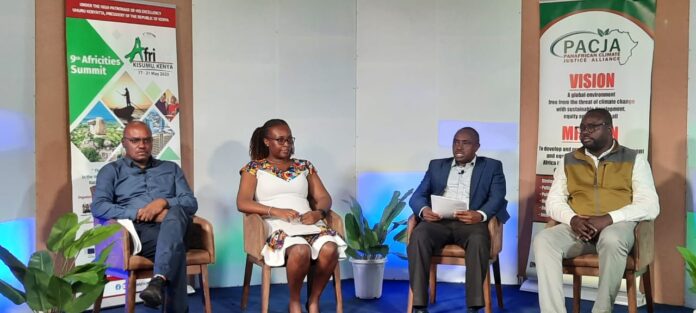
The African civil societies coalesced under the Pan African Climate Justice Alliance have called upon the African cities and local governments across the continent to play active roles in shaping the narratives for the 27th Conference of Parties to the UN Framework Convention on Climate Change set for Egypt later in the year.
In a statement released on the sidelines of the ninth Africities Summit holding in Kisumu in western Kenya, the CSOs said time was up for the African cities, under the aegis of the United Cities and Local Government Africa (UCLG Africa) to demand accountability from rich countries on their promised climate finance meant to build resilience and transition to low carbon development pathway.
“All the good things and plans on climate action discussed in the Kisumu Summit will amount to nothing if UCLG Africa will not pressure rich nations to honour and meet their pledges of USD100 billion per year in climate finance under Article 9 of the Paris Agreement,” said Charles Mwangi, Acting Executive Director of the Pan African Climate Justice Alliance, Africa’s largest coalition of civil societies who clamour for fair and just climate regimes for Africa.
Mwangi called upon Local Governments in Africa to join CSOs’ efforts to push developed countries to support accelerated implementation of Nationally Determined Contributions (NDCs) in African cities, whose populations are expected to surpass those of rural areas by 2050 according to the UN Habitat, a partner at the ninth Africities Summit.
According to Mwangi, the COP27 presents a unique opportunity for the Cities and Local Governments in Africa to pressure rich countries to compensate among others, for loss and damage through transparent, accountable and easy to access financial mechanisms.
Mwangi asked the UCLG Africa to urgently convene an African multi-stakeholder dialogue on loss and damage which will carry the aspirations of cities and their territories ahead of the COP27.
The CSOs hoped that members of the UCLG Africa will leave the ninth Africities ready to develop climate-responsive, climate-resilient, people-centred infrastructure in cities.
“As residents of Africa, one of the outcomes from this ninth Summit of the Africities is that I expect to see a just, liveable, sustainable and smart cities which collaborate with among themselves, public and non-state actors as espoused in the Marrakech Partnership Global Climate Action (MPGCA),” said Mwangi.
The CSOs said that coming from the Africities Summit, the citizens of Africa aspire to see fair, healthy, inclusive and resilient cities free from scarcity of energy, and water utilities, and neither chocked by waste pollution nor inefficient carbon-emitting transport systems.
This, noted the CSOs, will enhance the adaptive capacity of cities, protect vulnerable communities and restore new and existing infrastructure.
“We are asking that new and existing infrastructure financed by the African Union through AU-PIDA, African Development Bank, other DFIs and the private sector align with climate-resilient design and maintenance frameworks through an Urban Climate Action Plan and Built Environment Resilience Plan,” they said.
However, analysts said to help realise these, local governments must enact laws that are cognizant of the unique burdens of the urban poor in the context of current and emerging climate risks.
Local governments will also have to enact supporting laws that promote institutional and financial mechanisms in intermediary cities to effectively implement urban policies, plans and programmes as appropriate.











